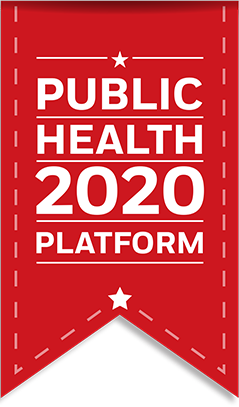Public Health 2020: America's Candidate

Public Health is running for office . . .

Public health’s name recognition is way up lately, but the current pandemic is not this candidate’s first rodeo. Much of what public health has accomplished in its decades of service has gone unnoticed. This candidate really has been everywhere, but many of the public services and processes it supports and helped develop don’t have the words public health in them. However, that doesn’t mean public health isn’t there in the background, doing important work to help keep America moving forward to better health.
Public health does not operate along partisan lines. In fact, public health transcends party divisions.
Public health does not operate along partisan lines. In fact, public health transcends party divisions. Its ideology is rooted in protecting and promoting everyone’s health.
Public health gets things done—it has been putting in the work everywhere for generations to help us all lead healthier lives. Now is the time to educate and inspire our fellow citizens to understand everything this candidate has done and can do. Together, we can propel public health from a dark horse to the frontrunner.
This candidate has broad and deep interests. Public health loves data and scientific evidence. It loves working on what makes individuals happy and what keeps families healthy. It loves social science, lab science, field science, and every other kind of science. It likes to ask people questions and find out what they’re thinking. It loves equity, has a big heart, and doesn’t like to see anyone in pain. Whenever public health sees injustice, disease, and other kinds of suffering, it pushes itself to alleviate them. What is this candidate’s main path to getting all that done? Collaborate, collaborate, collaborate!
Check this candidate’s record—throughout history, it has collaborated broadly. Public health’s roots run deep in a variety of disciplines, including epidemiology and statistics, occupational and industrial safety, urban planning, and hospital management. From Hippocrates to Clara Barton, from Virginia Apgar to Larry Brilliant, public health has been more concerned with results than credit.
If we cannot protect, improve, and ensure the health of everyone, then everyone’s health will be at risk.
We can stay with history and use one of this candidate’s favorite quotes from American history, “An ounce of prevention is worth a pound of cure.” Benjamin Franklin was talking about preventing house fires when he wrote that—and indeed, home safety, air quality, and municipal infrastructure are all part of preventing and fighting fires and are all aspects of public health.
But Franklin’s principle also illustrates public health’s effectiveness across all health-related factors in a population. We know that every dollar we spend on preventive health ultimately saves $5.60 in health spending. Every dollar spent on childhood vaccines saves $16.50 in future health care costs. Unfortunately—tragically even—75 percent of US health spending is on preventable chronic conditions such as obesity, heart disease, and diabetes, while only 3 cents of every dollar spent on health care goes toward preventive public health measures and research. Let’s look at those other 97 cents as an opportunity.
We have increased the average lifespan here in the US, reduced smoking and cancer rates, improved the quality of health care for many, and developed advanced biomedical research and specialized hospital systems that are the envy of many nations. But we continue to rank far behind other developed countries in our overall health outcomes.
Why? Because access to those incredible achievements is inconsistent across populations. Wealth, geography, and race continue to divide our nation and create spaces of health inequity—sometimes large spaces, sometimes entire cities.

If we cannot protect, improve, and ensure the health of everyone, then everyone’s health will be at risk. Nothing has demonstrated this more clearly—and acutely—than the current pandemic we are living with and dying from. But this principle remains true for managing other infectious diseases, chronic disease prevention, financing health care, and any other health issue you can think of.
Public health must be integral in our future, from developing a coronavirus vaccine to reducing the burden of diabetes and heart disease to mitigating climate change to making sure every child in the US has access to an education.
By supporting public health in this campaign, you’ll be standing up for your own health and safety, for the health and safety of your friends and family, and for a healthier, more equitable world for us and our children to live in. The future is brighter with public health.

Public Health 2020 Platform
Because public health is everywhere and touches all aspects of our lives, it must be a central consideration in all policy decisions our nation enacts, including the usual political spheres we hear about more than usual during election years—domestic and foreign policy, economic and social policy, and what the rule of law means in today’s America. So our central value is: public health in all policies. This principle will ensure more prosperity for more Americans and will ensure we spend every dollar we have responsibly. From agriculture to education to urban planning, we must focus on upstream causes to eliminate inequities, reduce costs, and improve health.
1. Make Everyone Healthier and Safer
Preventing disease and injury can stop human suffering before it begins. Prevention leads to better long-term outcomes—the ability to lead healthier, happier lives while spending less taxpayer dollars to get there. Using evidence from scientific research to improve our policies and behaviors, we can increase quality of life and overall life expectancy for every American. By investing now in vaccines, safety innovations, environmental improvements, safer and healthier foods, better ways to understand and manage chronic disease, and earlier detection of all disease, we can all be healthier and spend less money doing it.
2. Economic Vitality Equals Health
Every American should have access to reliable employment, a safe and affordable home, adequate health care and sick leave, and an excellent education. A strong economy, a robust job market, and equitable labor practices will help guarantee those core pieces of the American dream. An improved public health infrastructure will keep workers safe and healthy so they can support their families and continue doing their jobs well. We will keep families healthy by improving access to nutritional food and safe housing, assisting families struggling with student and medical debt, and investing in education.
From agriculture to education to urban planning, we must focus on upstream causes to eliminate inequities, reduce costs, and improve health.
3. Ensure Access and Choice
America has some of the brightest minds working on medical research to advance our understanding on how to treat and manage health care conditions. But many people face issues accessing health care, accessing mental health services, paying for prescription drugs, and getting treatment of all kinds. We need to ensure people can get the care they need and that everyone has the freedom to decide what happens to their bodies. Making essential clinical services widely available and affordable will benefit all of us by protecting the health of our population and by maximizing our financial resources. We must also deepen our focus on health literacy. Access to care means little without the personal empowerment to navigate the system.
4. Security through Health
The coronavirus pandemic alone has destabilized our economy, our supply chain, and our sense of security. Natural disasters can have the same effect—hurricanes, wildfire, flooding, drought, earthquakes, storm systems, heatwaves, polar vortexes. Each of them can increase the burden of disease and personal injury. Each can damage crops, destroy infrastructure, and weaken the sociopolitical fabric of this nation. We must focus the great spirit of American ingenuity on a new national public health system rebuilt, restaffed, and reinvigorated. Using prevention science research, we must invest in systems and staff that can plan for and respond to disease outbreaks, natural disasters, and any other security situation that requires public health expertise.
5. Protect and Defend Vulnerable Populations
The root causes of disease, injury, and disability nearly always begin with the social determinants of health—the economic and social realities that shape our health and our health status from before the day we are born. Health disparities are bad for everyone, because we all pay the price—in multiple ways—when anyone in our community is sick. It stands to reason that everyone should want to invest in reducing health inequities in this great nation. America has always stood for equality, and we should ensure the health of everyone who lives here equally. Being healthy includes freedom from discrimination, freedom from cycles of poverty, access to justice, access to education, and the meaningful involvement of all people in our society. None of us are healthy until all of us are healthy.
